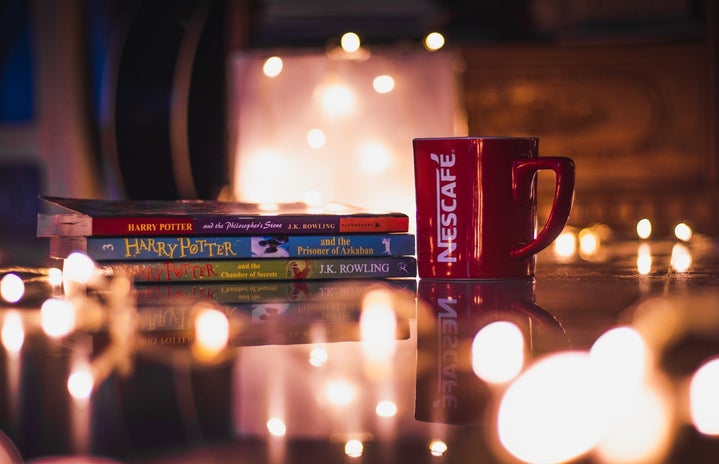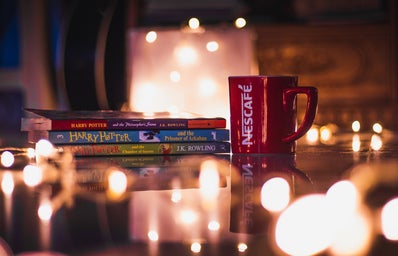I have loved the Harry Potter series since I first read Harry Potter and the Sorcerer’s Stone when I was ten years old. In the years that have followed, Harry Potter has evolved from a source of entertainment to a harbinger of comfort. When I need a little extra warmth in my life, a visit to a different world, or a sense of familiarity, Harry Potter is where I return.
The pandemic has forced all of us to seek comfort in strange places. Yes, I did reread most of the Harry Potter series while in quarantine, but I also took refuge in another piece of the Potter universe. With the decrease in human interaction over the past year, our sources for connection have become more creative. One of my primary forms of connection and community has been in the form of podcasts: in particular, Harry Potter and the Sacred Text.
The basic premise of Harry Potter and the Sacred Text is a weekly chapter-by-chapter analysis of the Harry Potter series. Each episode includes a snappy (often panicked) thirty-second recap of the chapter and an analysis of the chapter through the lens of a theme chosen beforehand such as ownership, compassion, honesty, resentment, or awareness. Next comes a sacred reading practice like the traditional Christian monastic practice of Lectio Devina or the ancient Jewish practice of Havruta. Finally, we hear a reflection via voicemail from a podcast listener and a blessing for two characters that appear somewhere in the chapter that week.

Harry Potter and the Sacred Text began at Harvard Divinity School where Vanessa Zoltan, a self-identified “atheist, Jew, and humanist” and Casper Ter Kuile, training to be a non-religious minister, began a weekly book club in which they practiced reading Harry Potter as a sacred text. The book club quickly grew in popularity, and with the help of Harvard Divinity student and digital producer Ariana Nedelman, Vanessa and Casper transitioned their sacred reading journey from a club to a podcast. Now, the podcast has morphed into a community of its own with listeners spread across the globe, online platforms for discussion, in-person sacred readings and meetings (currently remote, given the COVID climate) in cities around the world, Summer camps, classes, movie nights, and (prior to the pandemic) live shows.
Now, the podcast has nearly reached the end of the Harry Potter series. Once the series concludes, the podcast will restart at the beginning again with a new co-host for the show, Matt Potts, an Episcopal Priest and an Associate Professor of Religion and Literature and of Ministry Studies at Harvard Divinity School. Matt has appeared on the podcast multiple times already as a guest speaker. I always enjoy hearing his thoughts and engaging with the quiet, contemplative, and compassionate way in which he seems to perceive the world. I will miss Casper, but I’m excited to see how the show evolves with Matt’s perspective, especially when paired with Vanessa’s fiery wit and often-cynical (though undeniably satisfying) thoughts and insights.
As the show approaches the end of The Deathly Hallows, it seems a fitting time to reflect on the role it has played in my own life (a role for which I feel truly grateful). Even though Harry Potter and the Sacred Text is not over, I can’t help but feel a similar mix of dread and thrilling anticipation that I felt as I neared the conclusion of The Deathly Hallows back when I read the Harry Potter books for the first time. There’s a desperation to hold on to something that has given my life a new layer of meaning, something that gives me solace when little else can. My favorite aspect of the show is the balance it manages to strike between lively and weighty. It is at once witty, sunny, thoughtful, grave, and reflective. It is one of the rare pieces of media that I can consume at any time in any mood. This past year, I’ve put on Harry Potter and the Sacred Text while washing dishes (in the tiny sink in my dishwasher-less cabin), performing ab-searing (…on the good days at least) home workouts on the yoga mat beside my bed, driving home from my parents’ house on rainy Oregon nights, during beach walks with the Autumn sun shifting between clouds above and my bare toes going numb in the freezing sand below. I listen to Harry Potter and Sacred Text before bed when I’m alone in my room and the house feels too silent, too absent, too hollow. During this sometimes-lonely time for the world, this podcast pulls me into a place of warmth and friendship. It is a community that I can return to anytime I want.

Treating a text like the Harry Potter series as sacred doesn’t mean worshipping it. Contrary to what those who know me might assume, I do not in fact pray to Harry before I go to sleep at night. Sacred reading is about pulling yourself into a text and engaging with it. You might choose to do a sacred reading of a favorite children’s book, a cooking blog post from a chef you admire, the lyrics to a Bob Dylan song (or Taylor Swift, or Lizzo, if that’s more your vibe), or a Shouts and Murmurs column in the New Yorker (kudos to you if you can manage that). It’s not about accepting what the text says as finite or perfect; rather, it’s about fervent questioning, trusting that we can discover new ideas and wisdom through the way that we choose to engage the text, and building a community of people who want to engage in those questions together. No part of Harry Potter is sacred, but the way we choose to engage with it (and for that matter, the way we choose to engage with anything in our lives) can be. What I find beautiful about the practice of sacred reading is that it sparks me to seek meaning and joy in every part of my life. It is a reminder to keep questioning and to treat the world around me with awareness and care.
You can access Harry Potter and the Sacred text online at https://www.harrypottersacredtext.com/ or through a variety of podcast sources including Apple Podcasts, Spotify, Google Podcasts, Radio Public, and Stitcher.


